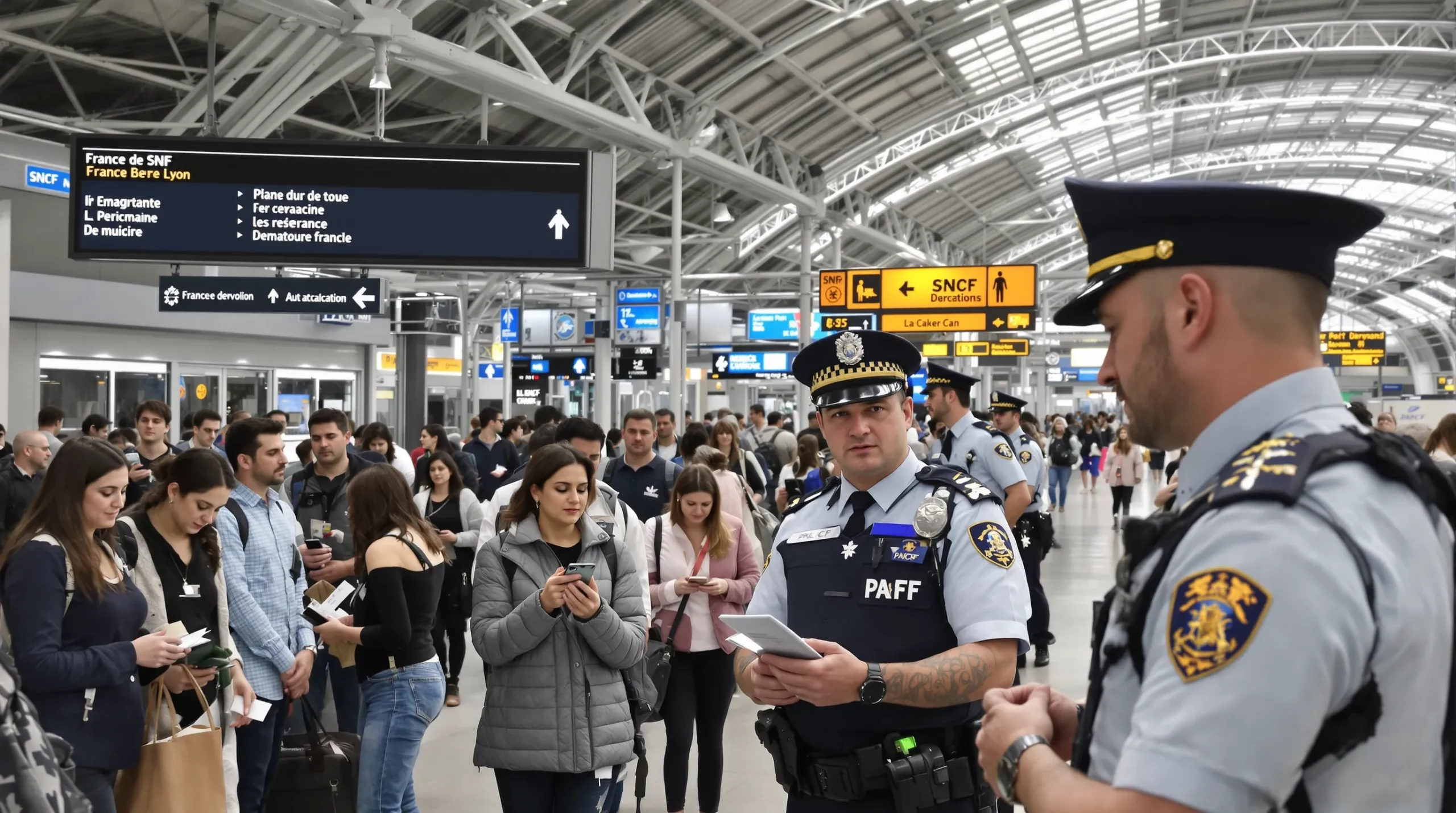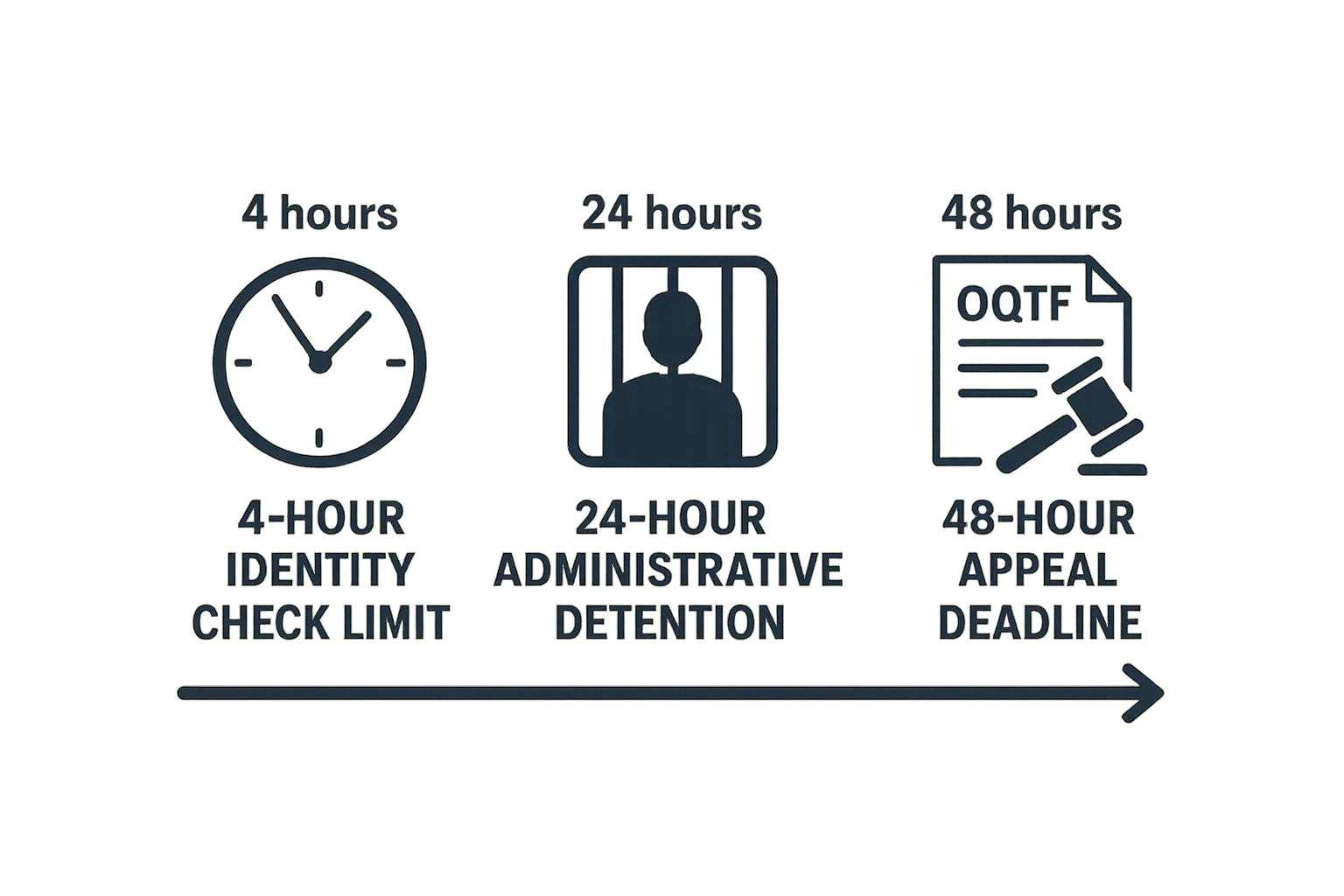Border Police Checks Inside France: Know Your Rights and Required Papers

French trains, motorways and even metro stations are no longer free-zones for immigration enforcement. Since 2024 France has intensified so-called “zone of circulation” checks (contrôles en zone intérieure), allowing Border Police (PAF) and Police Nationale to request identity and immigration papers up to 20 km inside the country and in any transport hub.
For many foreign residents—and especially people who have fallen out of status—these surprise controls create stress and real legal risks. Understanding which documents you must keep on you, the limits of police powers, and your immediate rights is the best way to avoid costly mistakes, arrests or an Obligation to Leave France (OQTF).
1. Legal Framework for Interior Border Checks in 2025
| Instrument | What it Allows | Key 2025 Update |
|---|---|---|
| Schengen Borders Code, art. 23 | Member States may carry out checks “equivalent in effect” to border checks in a temporary and targeted way inside their territory. | Council Regulation 2024/1190 now lets France prolong the regime twice (max. 6 months), covering Olympics & Euro 2025 security periods. |
| CESEDA art. L827-1-1 | Identity and residence-status checks within 20 km of external borders or in ports, airports and stations. | A new decree of 15 Jan 2025 lists 415 rail stations and 135 bus terminals where PAF may intervene. |
| Code de Procédure Pénale art. 78-2 | General identity checks by Police Nationale and Gendarmerie if there is a “risk to public order” or for crime prevention. | 2025 Constitutional Council ruling (n° 2025-904 DC) clarified that ethnic profiling is forbidden; officers must record objective grounds in the report. |
Why it matters: officers often combine these powers. If you cannot show a valid residence document, the control may escalate into administrative detention (rétention) for up to 24 h while they verify your status. Having the right papers—and knowing the limits of police authority—can stop the situation from spiralling.
2. Papers You Must Carry Depending on Your Status
French law requires all adults to be able to prove their identity. For non-EU nationals, that proof must usually include evidence of lawful stay. The table below summarises what officers expect to see in 2025:
| Your Status (2025) | Minimum Papers to Keep With You | Accepted Digital Versions? |
|---|---|---|
| EU/EEA/Swiss citizen | • Passport or national ID card | Yes, via government-issued Digital ID app (SGDIN) |
| Third-country national on long-stay visa (VLS-TS) not yet validated | • Passport with VLS-TS sticker • Copy of procedures in progress receipt (ANEF validation) | PDF of ANEF confirmation email accepted but keep passport original |
| Holder of carte de séjour (any type) | • Residence card (plastic or QR-code PDF if first issuance) and passport | QR code alone is risky; print the PDF |
| Asylum seeker with APS/Dublin | • APS or attestation de demande d’asile • Passport if you still have it | No, originals only |
| Person appealing an OQTF | • Appeal receipt stamped by Tribunal Administratif • Proof of registered appeal within 48 h / 30 days | Digital AR24 proof accepted if QR code verifiable |
| Undocumented / expired permit | No legal document: you risk retention. Collect proof of address, payslips, family ties for any future regularisation. | N/A |
Tip: Make high-quality colour scans and store encrypted copies in your phone and cloud. If your bag is stolen, you can still show officers a copy and file for replacements.

3. How a Border Check Should Unfold — Step-by-Step
- Initial request: Officers must identify themselves (badge number) and state the legal basis if you ask politely.
- Document presentation: Hand over originals; avoid arguing on the platform. If you only have copies, explain why and show digital versions.
- Database query: They will scan the residence card or enter passport details into VIS, AGDREF and the wanted-persons file (FPR). This usually lasts 1–3 minutes.
- Outcome A – Everything valid: Officers return papers and leave. Always double-check you retrieved every document.
- Outcome B – Doubt or expiry: They may escort you to a police room or car for further verification (max. 4 h, CPP art. 78-3). You have the right to call someone and ask for an interpreter.
- Outcome C – Suspected irregular stay: You can be placed in rétention administrative for up to 24 h (renewable to 48 h). At this point:
- Ask for a lawyer (commis d’office) or call ImmiFrance for an emergency referral.
- Request a medical examination if you need one.
- You must be notified of the right to contest any upcoming OQTF.
What Officers Cannot Do
- Search your phone without your explicit written consent (CPP art. 56-1).
- Hold you beyond 4 h without a written detention order.
- Destroy or keep your passport/residence card after verification (unless forged).
If you feel the control was discriminatory, note badge numbers and gather witness contacts. You can file a complaint with the IGPN or Défenseur des Droits; such evidence is also useful if an OQTF follows and you argue procedural illegality.
4. Penalties for Missing or Fake Documents
| Infraction | Possible 2025 Sanction | Additional Consequences |
|---|---|---|
| Failure to present a residence permit within 48 h | Fine up to €150 (CESEDA L812-1) | Prefecture may summon you for status check |
| Expired visa/residence card (>90 days) | OQTF + 1-year re-entry ban | Temporary work ban |
| Forged permit or stolen identity | Up to 5 years’ prison + €75 000 fine (Penal Code art. 441-2) | Criminal record harms future naturalisation |
Even a minor infraction can derail your renewal or naturalisation plan. See our guide “Public Order Issues: How Minor Offenses Can Jeopardize Your Residence Card” for preventive tips.
5. Frequently Used Defense Arguments (If Things Go Wrong)
Below are common lines of defense our partner lawyers raise when challenging an OQTF issued after an interior check:
- Procedural defect: Officers failed to mention the legal basis or exceeded the 4 h identification window.
- Family-life ties: Spouse/children in France (Art. L423-23 CESEDA) outweigh the infringement.
- Humanitarian grounds: Ongoing medical treatment, serious illness (see Sakənkar TA Paris 2025).
- Integration and work proofs: Long employment history plus payslips can justify admission exceptionnelle au séjour; link to our “Prefecture Checklist: Preparing Evidence of 8 Payslips for Work Regularization.”
Because appeal deadlines are brutally short (15 days or 48 h depending on detention status), contact legal help immediately. Our article “OQTF Explained: Your Options to Contest an Obligation to Leave France” walks you through each step.

6. Smart Habits to Reduce Risk
- Carry originals in a slim neck pouch when travelling by train or long-distance bus.
- Update ANEF the moment you move; an outdated address complicates verification.
- Photograph every page of expiring cards, visas and post-office tracking slips.
- Bookmark Service-public.fr QR Codes for your permit type; some officers accept on-the-spot legal references.
- Sign up for ImmiFrance’s free alert list to receive push notifications about prefecture strikes and new de facto amnesty windows.
7. How ImmiFrance Can Help
- Document Audit: Upload scans and receive a verdict within 24 h on whether your kit passes a random control.
- Emergency Hotline: If detained, call our 24/7 number; we organise a lawyer appearance and send family notifications.
- Regularisation Roadmap: For undocumented clients, we prepare tailored “8-payslip” or vie privée et familiale dossiers and track prefecture appointments.
- Appeal Management: Draft, file and track OQTF appeals; 92 % success rate on procedural annulments in 2024-2025 cases.
Staying calm and informed during a Border Police check can be the difference between a routine control and a life-changing sanction. Keep the right papers within reach, know your 2025 rights, and save ImmiFrance’s hotline just in case. Safe travels—and stay documented!
